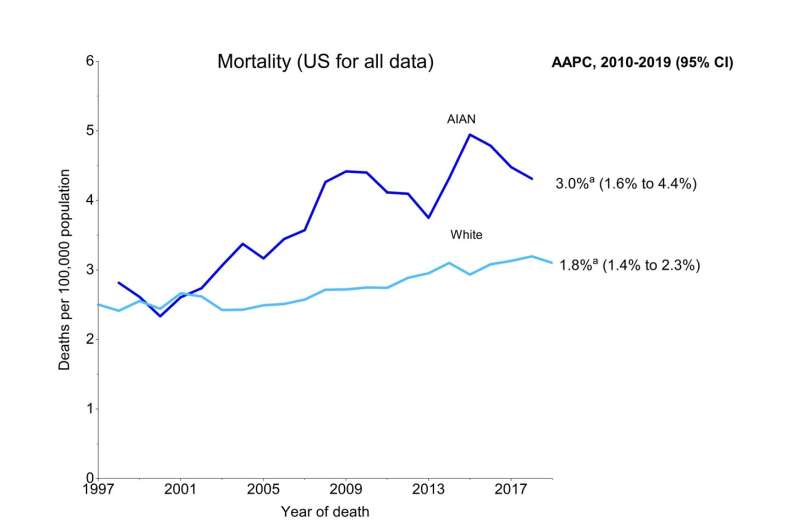Cancer mortality higher among American Indian and Alaska Native individuals; colorectal cancer before age 50 rising

New findings by researchers at the American Cancer Society (ACS) show overall cancer mortality among American Indian and Alaska Native (AIAN) individuals is 18% higher than among white individuals despite similar cancer incidence. This disparity is driven by common cancers that are receptive to early detection. For example, breast and prostate cancer incidence rates are 15% and 12% lower, respectively, whereas mortality rates are 8% and 31% higher. The study, published today in CA: A Cancer Journal for Clinicians, includes the first nationwide mortality data published for this population.
Study authors comprehensively examined cancer incidence and mortality among non-Hispanic AIAN individuals compared with non-Hispanic white individuals for context, using population-based data from the National Cancer Institute, the Centers for Disease Control and Prevention, and the North American Association of Central Cancer Registries.
The results showed overall cancer rates among AIAN individuals were 2% higher than among white individuals for incidence (2014 through 2018, confined to Purchased/Referred Care Delivery Area counties to reduce racial misclassification) but 18% higher for mortality (2015 through 2019, nationwide). However, disparities varied widely by geographic region and cancer type.
Colorectal cancer incidence and mortality rates are both approximately 40% higher among AIAN individuals than white individuals overall, but among Alaska Native people specifically, incidence is 2.5 times higher. According to the study authors, this disparity is being exacerbated by steeper increases in early-onset colorectal cancer; rates rose by 85% from 1998-2002 to 2014-2018 among Alaska Native individuals ages 20-49 years (from 18.8 to 34.8 cases per 100,000) versus 33% among white individuals (from 9.4 to 12.5 per 100,000 cases).
Death rates for infection-related cancers (liver, stomach, and cervix), as well as kidney cancer, were approximately two-fold higher among AIAN individuals compared with white individuals.
"Our report shows that the American Indian and Alaska Native community is disproportionately impacted by cancers that are either preventable or detectable early, when treatment saves lives," said Tyler B. Kratzer, associate scientist II, cancer surveillance research at the American Cancer Society and lead author of the study. "These findings highlight the need for more effective strategies to reduce the prevalence of chronic oncogenic infections and improve access to high-quality cancer screening and treatment for this group of individuals."
"Mitigating the disparate burden will require expanding financial support of tribal health care as well as increased collaboration and engagement with this marginalized population," added Kratzer.
Rebecca Siegel is senior author of the study. Other ACS authors include: Dr. Ahmedin Jemal, and Dr. Robert Smith.
More information: Tyler B. Kratzer et al, Cancer statistics for A merican I ndian and A laska N ative individuals, 2022: Including increasing disparities in early onset colorectal cancer, CA: A Cancer Journal for Clinicians (2022). DOI: 10.3322/caac.21757




















